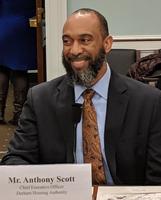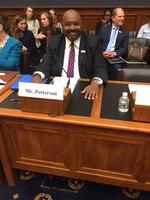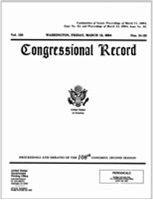CLPHA supports the nation’s largest and most innovative housing authorities by advocating for the resources and policies they need to solve local housing challenges and create communities of opportunity. We frequently champion our members' issues, needs, and successes on the Hill, at HUD, and in the media. In these arenas CLPHA also advocates for legislation and policies that help our members, and the public and affordable housing industry as a whole, strengthen neighborhoods and improve lives.
Click below for links to congressional testimonies, statements for the record, action alerts, comments to HUD and other federal agencies, and the latest information about CLPHA's multi-pronged housing advocacy.
- « first
- ‹ previous
- 1
- 2
- 3
- 4
|
Now on day 31 of the nation’s longest government shutdown, three days after the President offered a deal House Democrats called a non-starter, it is still unclear when Congress and the President will reach a compromise to reopen and fund government agencies including the Department of Housing and Urban Development (HUD). CLPHA is aware of the impacts of this uncertainty, particularly as we move closer to the point when HUD will no longer be able to provide Operating Fund and Housing Choice Voucher payments. Last Friday, CLPHA contacted HUD regarding March payments and staff responded that they are planning to issue a communication on March payments and then follow up with additional guidance. CLPHA will provide more detail as soon as it is available. CLPHA has also called on Congress and the President to end the shutdown and joined with national housing leaders through the Campaign for Housing and Community Development Funding (CHCDF), where CLPHA is a member of its Steering Committee, to warn of its impact on affordable housing and communities. On January 15, CLPHA participated in a national conference call with CHCDF for more than 2,000 PHA leaders, advocates, policymakers, and the media to provide examples from our members of how the shutdown is impacting PHA operations, residents, landlords, and tenants. You can listen to a recording of the CHCDF national call at: https://bit.ly/2DersVM CLPHA Executive Director Sunia Zaterman said in a joint CHCDF press release: |
|
|
CLPHA’s comments led to follow-up interviews with the Huffington Post, CNBC, and Multi-Housing News which featured Zaterman in today’s article Mutlifamily, Affordable Housing Groups Lobby Congress as Government Shutdown Continues. CLPHA and CHCDF worked with Congressional offices to support a joint letter of 137 House members and 33 Senators to the President underscoring the harmful impacts of the shutdown on the nation’s housing programs, including public housing. Additional Congressional action around the shutdown from the Senate and House include a letterfrom the Ranking Member of the Senate Banking Committee Sherrod Brown to HUD Secretary Carson calling for a description of what the agency is doing to mitigate the impacts of the shutdown on people who are assisted by HUD’s programs. House Financial Services Committee Chairwoman Maxine Waters also sent a letter to Secretary Carson expressing concerns about HUD’s failure to ensure appropriate responses to emergency situations and adequate funding for housing programs that affect HUD-assisted families, homeless assistance providers and private landlords. House Appropriations Chairwoman Nita Lowey announced on January 17, that the Democratsreleased a package of six bipartisan bills to reopen most of the federal government including HUD. The package reflects conference agreements for six appropriations bills. According to her press release:
CLPHA will continue to advocate for a swift end to the shutdown and for full year spending bills to fund HUD. |
|
|
||
|
Additional HUD Guidance for MTW Agencies
|
||
|
On January 17, HUD provided the following guidance to MTW agencies regarding the HUD-held HCV reserves. PIH Deputy Assistant Secretary Danielle Bastarache wrote:
|
|
|
||
|
How is the Shutdown Impacting Your PHA?
|
||
|
We appreciate members who have shared examples of how the shutdown is impacting their PHA and residents. These insights have been incredibly helpful to CLPHA as we’ve tried to understand the full extent of the impact on the people we serve. If you are willing to share examples of how the shutdown is impacting your PHA, and how you are responding to questions from residents, landlords, elected officials, and the media, please email Emily Warren at [email protected]. Please indicate if you are willing to be quoted with attribution.
|
CLPHA’ Executive Director Sunia Zaterman spoke to Multi-Housing News about the disastrous effect the shutdown will have on not only on Housing Choice Voucher funding and other rental assistance programs, but also affordable housing projects, if it continues beyond February. Zaterman added that if the shutdown continues into March, for smaller landlords and property owners especially “there is a huge concern about the ripple effect and concerns about bankruptcy and foreclosure.”
However, as Zaterman noted in a January 16, 2019, joint press release accompanying a national conference call about the effects of the partial government shutdown on low-income people and communities and the affordable housing programs that serve them, the shutdown is already a catastrophe for millions who rely on HUD funding. “Anxious residents and landlords fearful of missed payments, combined with other cascading impacts due to lack of staffing at HUD, including program grants not being renewed and affordable housing development deals not being approved, amount to an unmitigated disaster for millions of low-income families,” said Zaterman.
Washington, DC – Members of the Campaign for Housing and Community Development Funding (CHCDF) hosted a national call with over 2,200 registrants yesterday, January 15, about the effects of the partial government shutdown on low-income people and communities and the affordable housing programs that serve them.
Experts from multiple affordable housing organizations shared information on the shutdown’s impact on federal affordable housing and community development programs and emphasized that the longer the shutdown continues, the more negatively it will impact people with the lowest incomes – seniors, people with disabilities, and families with children. Panelists spoke about the shutdown’s effects on public housing, project-based rental assistance, housing vouchers, rural housing, and housing and services for seniors, people with disabilities, the homeless, and those at risk of homelessness.
The panel encouraged listeners to contact their members of Congress and tell them to vote now—before residents in federally assisted housing experience rent hikes and evictions—to reopen the federal government and pass clean fiscal year 2019 spending bills. Listeners were also urged to encourage their members of Congress to sign onto a “dear colleague” letter led by Senator Mark Warner (D-VA) and Representative Marc Veasey (D-TX) to be sent to President Trump on the shutdown’s severe consequences for affordable housing.
“Nearly 700 property owners that have HUD contracts to operate housing affordable to the lowest-income seniors, people with disabilities, and families with children have seen those contracts expire due to the shutdown, and more will expire this month and next,” said NLIHC President and CEO Diane Yentel. “These contract suspensions put the homes of nearly 70,000 low-income renters at risk of serious rent hikes and evictions. HUD has asked owners of these properties to dip into their savings, if they have any, to cover the costs. Some will be able to do so, but not forever, and some have already communicated to their tenants that rent hikes are coming. The longer the shutdown goes on, the more untenable it will become for properties owners to keep scraping by without their federal contracts - and the more the lowest-income renters will suffer.”
“Public housing authorities, which are responsible for housing over 3 million low-income households nationwide, are doing everything they can to keep things running during this period of tremendous uncertainty, but it is unclear how long they can continue with business as usual for residents and landlords,” said Council of Large Public Housing Authorities Executive Director Sunia Zaterman. “Without a guarantee from HUD that funding will be available in March, many PHAs will need to notify landlords and residents next month that delayed payments are a possibility. Anxious residents and landlords fearful of missed payments, combined with other cascading impacts due to lack of staffing at HUD, including program grants not being renewed and affordable housing development deals not being approved, amount to an unmitigated disaster for millions of low-income families.”
“As the budget stalemate continues, the impact on small towns and rural families grows more severe. Everyday Americans are losing out on billions of dollars’ worth of affordable housing, clean drinking water, and community facilities, like town halls, fire stations and hospitals,” said Housing Assistance Council CEO David Lipsetz.
“HUD has made clear already, in December, [it has] not renewed 224 contracts for rental assistance in Section 202 Housing for the Elderly communities, and more are set to expire in January,” said LeadingAge President and CEO Katie Smith Sloan.“LeadingAge’s members, all nonprofits, rely on regular and adequate funding to provide quality affordable housing to some of the nation’s lowest-income older adults. The average older adult in HUD’s Section 202 Housing for the Elderly program has an annual income of $13,300, an income far too little to make ends meet in any private housing market. More than 400,000 older adults rely on the Section 202 program, while another 1.2 million rely on other HUD programs for housing assistance. We urge Congress and the White House to end the shutdown so that . . . these 1.6 million older adults have the stable housing they need to age with dignity.”
“The shutdown’s impacts range far beyond Washington, DC,” said National Association of Housing and Redevelopment Officials CEO Adrianne Todman. “It’s hurting workers, small businesses, farmers, and housing providers across the country. Housing providers are struggling with contingency plans to make repairs to units and to pay landlords in the voucher program. And guess who will suffer the most? The low-income families and seniors who rely on a functioning federal government. They are at risk now and will be at even greater risk as the shutdown continues. If any of these families are harmed by the shutdown, the blame lays squarely at the feet of the White House and the Congress.”
“Every day that it drags on, the needless government shutdown threatens more low-income seniors, people with disabilities, and seniors who rely on critically important federally assisted affordable housing,” said National Housing Trust Federal Policy Director Ellen Lurie Hoffman. “Private rental housing owners are scrambling to cover operating costs for which the federal government is contractually responsible, with no end in sight.”
Listen to the CHCDF national call on the impacts of the shutdown on affordable housing programs and community development at: https://bit.ly/2DersVM
Read NLIHC’s latest update on the shutdown at: https://bit.ly/2AzHoju
Check out NLIHC’s interactive map and a state-by-state breakdown of how the shutdown is impacting some HUD-assisted housing.
###
About the Council of Large Public Housing Authorities (CLPHA): The Council of Large Public Housing Authorities is a national non-profit organization that works to preserve and improve public and affordable housing through advocacy, research, policy analysis and public education.
About National Low Income Housing Coalition (NLIHC): Established in 1974 by Cushing N. Dolbeare, the National Low Income Housing Coalition is dedicated solely to achieving socially just public policy that assures people with the lowest incomes in the United States have affordable and decent homes.
About Campaign for Housing and Community Development Funding (CHCDF): An education, strategy and action hub led by NLIHC. The coalition of more than 70 national organizations works to ensure the highest allocation of resources possible to support affordable housing and community development. CHCDF’s members represent a full continuum of national housing and community development organizations, including faith-based, private sector, financial/intermediary, public sector and advocacy groups.







